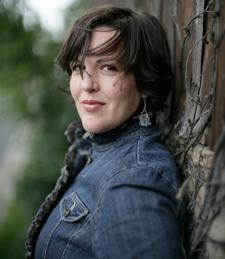With a foreign army posed to invade in the name of freedom a midcareer artist creates a monumental work, inspired by real events, about a woman who goes undercover in a prison to expose the secret incarceration of political prisoners by corrupt officials.
The artist doesn’t live in contemporary Afghanistan or Iraq but Austria at the dawn of the 19th century.
The 1805 premiere of Ludwig van Beethoven’s opera Fidelio in Vienna took place one week after Napoleon’s army occupied the city. It tells the story of Leonore who disguises herself as a man, called Fidelio, in order to get work in a prison. She’s trying to find out what happened to her husband who disappeared two years before after he criticized the prison governor, Pizarro.
“I think it’s a gripping story which totally resonates today in the time of war,” says superstar Canadian soprano Adrianne Pieczonka who sings Leonore in a new production of Fidelio for the Canadian Opera Company (COC) opening Sat, Jan 24. “The message is that love, devotion, faith and determination can truly move mountains, break down walls and chains that bind.”
Fidelio is Beethoven’s only opera and in its final form (it was reworked substantially over the 10 years following the premiere) it bursts forth with potent and moving orchestral and vocal music. Some moments are overwhelming. The role of Leonore demands a powerful dramatic soprano capable of radiant tones and angelic lyricism, attributes Pieczonka is celebrated for. When she debuted at Bayreuth in a production of Wagner’s Die Walküre she was heralded as “the Sieglinde of our time,” a moniker confirmed with subsequent performances at the Met and COC. The critical superlatives keep coming for her leading ladies in operas by Verdi, Strauss, Puccini, Mozart… and now Beethoven. This is the first time she’ll sing Leonore.
“It’s a fiendish part in places but it’s also glorious in places,” writes Pieczonka in a written interview (saving her voice during the first week of rehearsals). “My plan is never to force my voice over the orchestra. I do think the writing is sort of Mozartean in many ways and so I will sing it in a Mozartean style when I can.”
For those unfamiliar with the opera or with the German tradition of singspiel, the inclusion of spoken dialogue in Fidelio can be unsettling — same for the singers. “I speak fluent German but still dialogue is always a challenge… to have to switch from using the voice as an actor and then using it as a soprano moments after.”
Pieczonka’s career first bloomed in Vienna. After graduating from U of T’s Opera Division and garnering a scholarship to study in London she won a couple of prestigious competitions and was offered a position at Vienna Volksoper in 1989. Vienna became home base for a successful European career. In 2007 she was named a Kammersängerin — Austria’s highest honour for singers (the Order of Canada would come later that year).
Pieczonka thinks her Viennese experience gives her some insight into the opera. “Fidelio premiered at the Theater an der Wien, a small theatre in Vienna where I have also performed quite a bit. After the Vienna State Opera was completely bombed during World War II it was rebuilt over the course of a few years. The opera they chose to inaugurate the newly restored house was Fidelio. This must have been a very moving and historic occasion. I saw many famous singers sing Fidelio when I lived in Vienna [like] Gundula Janowitz, Gwyneth Jones.”
Designed by Andreas Wilkens and Gabriele Heimann, the COC coproduction with the Opéra National du Rhin and Staats-theater Nürnberg premiered last year in Germany. Restaging the production is original director Andreas Baesler; the conductor is Gregor Bühl. All make their COC debuts.
“The production is very organic, very simple in a way,” states Pieczonka. “In some places it becomes stylized, which I think works well. It’s got a gritty Kafka or George Orwell feel to it. The sets are very powerful and evocative.”
US tenor Jon Villars is husband Flor-estan, Israeli-South African bass-baritone Gidon Saks is Pizarro, Swedish bass Mats Almgren is the jailer Rocco and Canadian soprano Virginia Hatfield is the jailer’s daughter Marzelline. Pieczonka says the mood during rehearsals is “very friendly and collegial. No clashes of egos yet!
“This isn’t always the case.”
By the opera’s end the character Marzelline is rather hard done by. She has fallen in love with Fidelio (Leonore); in fact, that love helps Fidelio gain access to the prisoners and eventually rescue her husband. The revelation of Fidelio’s true identity is a moment of awe and inspiration, but doesn’t leave much room to address what must be Marzelline’s conflicted emotions. “Of course I do feel badly that she finds out quite abruptly that I am not a man after all,” writes Pieczonka. “There is a brief moment at the end of the opera where our eyes meet and I sort of say with my eyes, ‘I’m sorry for hurting you and please forgive me.’ It’s a poignant moment and I hope the audience will not laugh and find it silly.”
Pieczonka is at the top of her game. In addition to releasing her second solo recording, a CD of Puccini arias, this year sees Pieczonka returning to the Met as Sieglinde and reprising her Prima Donna in Ariadne in Munich among numerous other engagements.
A recital in Hamilton last November, however, has a unique place as a sort of homecoming in the Burlington-native’s heart. It was with her wife, Canadian mezzo-soprano Laura Tucker.
“It was really special,” says Pieczonka. “I grew up in Burlington and my mom was born in Hamilton. Performing with Laura was just terrific and we enjoyed the recital very much. There was a lot of love in the audience — many old friends and family and many of my parents’ friends and family.”
The singers met during the COC’s 2004 production of Die Walküre. Pieczonka moved back to Toronto in 2005 and the couple now make their home in the Annex with their three-year-old daughter.
Do they have a favourite duet? “Our daughter is called Grace and we love to sing ‘Amazing Grace’ as a duet, sometimes a cappella… just the voices and the words. Lovely.”


 Why you can trust Xtra
Why you can trust Xtra


